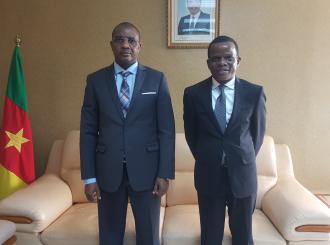
Yaounde, June 21, 2020 (ECA) – Cameroon’s Minister of Mines, Industry and Technological Development of - Gabriel Dodo Ndoke - and the Director of the Sub-regional Office for Central Africa of the Economic Commission for Africa (CEA) - Antonio Pedro - have reaffirmed their resolve to work in close collaboration for the structural transformation of the economy of Cameroon, underpinned by an inclusive and dynamic industrialization strategy.
The two personalities had a working session on June 24, 2020 in Yaounde to revisit the collaborative framework between their two institutions, particularly on the key role that the Cameroon Industrial Development Masterplan (PDI, in French) must play in the structural transformation of the country. ECA is already providing technical support for the Plan’s update and roll-out.
Discussions between Minister Dodo Ndoke, Mr. Pedro and their collaborators focused on several areas related to the industrial development of Cameroon in particular and Central Africa in general.
At the outset, the two personalities spoke of the relevance of the ECA “Pharma” Initiative which aims to support African countries in facilitating the supply of essential pharmaceutical products in the fight against COVID-19 in the short-term as well as the reinforcement of the productive capacities of the nascent local pharmaceutical industries, in the long term. .
“Cameroon imports more than 90% of its pharmaceutical products - which indicates that the country has a huge local market from which the local productive sector, in collaboration with the order of pharmacists and stakeholders of traditional pharmacopoeia, should benefit for the development of an integrated and competitive local value chain,” said Mr. Pedro.
According to the senior ECA official, the development of the local pharmaceutical industry is a definite opportunity for the country's integration into the African Continental Free Trade Area (AfCFTA). These sectoral efforts figure prominently in Cameroon National AfCFTA Implementation Strategy, on which the Ministry of Economy, Planning and Regional Development (MINEPAT) has received ECA’s technical support in its formulation.
According to Minister Dodo Ndoke, “ECA's proposals on the pharmaceutical industry are timely since the President of the Republic of Cameroon has just authorized special actions, targeted and conditioned by the COVID-19 crisis among which the development of the pharmaceutical industry is in pole position”.
The ECA Director also mentioned the challenges faced by different economic sectors in Cameroon before proffering some ideas for solutions to the issue of sustainable and inclusive industrialization of the country notably in the domains of agriculture and textiles.
Mr. Pedro highlighted the role that special economic zones and other industrial clusters can play in the emergence of a competitive industry. In this light, he drew the Minister's attention to the concept of the “Kribi-Edéa-Douala growth triangle” being promoted by ECA in collaboration with the ministry to accelerate the implementation of the PDI through a pilot zoning approach.
The economists of the Central Africa Office of the ECA posit that by their proximity and attractive endowments in human and natural resources, the cities of Douala, Edea and Kribi, spaced-out by about a hundred km back-to-back, have an undeniable collective potential for the development of a pilot industrial cluster. This is especially so thanks to the volume of investments in infrastructure that they concentrate as well as their strategic position in the promotion of sub-regional trade.
Mr. Pedro said it is along the same lines that the Senegalese government created the Dakar-Thiès-Mbour Prosperity Triangle, recognized as a special sustainable and successful economic zone.
ECA's efforts to bring ECCAS and CEMAC closer together towards a single and consolidated Industrialization and Economic Diversification Masterplan for Central Africa (PDIDE) were commended by the Cameroonian Minister who encouraged the strengthening of links between these interventions at regional level and industrialization efforts at the national level. He said PDIDE/Central Africa should be unifying in mapping out main guidelines for the national plans of member States.
The Minister and his host decided to finalize, as soon as possible, a framework for collaboration between their two institutions for support to Cameroon’s industrial development drive. To this end, ECA is in good posture to mobilize other technical and financial partners, including other UN agencies in particular.
-END-
Media Contact
Abel Akara Ticha - Communication Officer
United Nations Economic Commission for Africa
637, rue 3.069, Quartier du Lac, Yaounde, Cameroon
Tel: +237 222504348
E-mail: akara@un.org